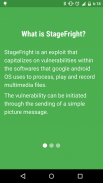





Stagefright Protection

Stagefright Protectionの説明
>What is Stagefright?
Stagefright is an integral part of the Android code; it is a media library that processes several popular media formats.
Use the The Stagefright Protections app to check whether your device needs to be patched against the newly discovered StageFright bug that leaves Android users open to malicious attacks.
The Stagefright Protection app is designed to check your Android device’s protection status and help you take appropriate action to ensure that your device and data remain safe.
The StageFright Bug- A dangerous texting vulnerability in Android
>StageFright Vulnerability and Associated Threats:
A critical vulnerability recently reported by a leading mobile security firm, Zimperium .The kinds of vulnerabilities detected are termed, remote code execution vulnerabilities. The easiest way of exploiting this vulnerability would be to execute malicious code delivered via MMS. The danger lies in the fact that no action is required on the user-end to execute the code.
>Extent of the Problem:
The issue affects an estimated 950 million devices and attackers only need your mobile number to launch an attack.
>Vulnerable Android Versions:
Mainly users of the pre-Jellybean versions of the Android system
Froyo 2.2 to Lollipop 5.1.1
>Securing Your Device
The first thing to do is to detect if your device is vulnerable, the Stagefright Protection app helps you in this step. The next step would be to download and install the appropriate software patch meant specifically for your device and provide tutorial how to protect by MMS settings.
Disclaimer:
-The Stagefright Protection will not fix the code vulnerability in StageFright; it informs you that if your device is open to attack and how to protect from it.
-Please download and install the update patches released by your device manufacturer or cell phone carrier or Google.
>More Information and Details:
Read the details by looking up the following CVEs (Common Vulnerabilities and Exposures)
CVE-2015-1538, CVE-2015-1539, CVE-2015-3824, CVE-2015-3826, CVE-2015-3827, CVE-2015-3828, CVE-2015-3829
























